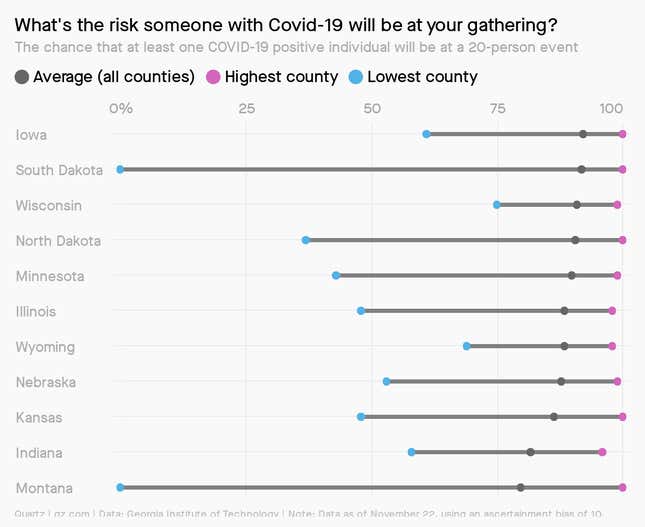Good morning, Quartz readers!
Here’s what you need to know
India’s Supreme Court wants Covid-19 answers. The top court has asked the federal government and the states for status reports within two days. Meanwhile, AstraZeneca and the University of Oxford announced their coronavirus vaccine is roughly 70% effective, which should be welcome news for countries like India, as it is cheaper and easier to store than candidates from Pfizer/BioNTech and Moderna.
Prominent Hong Kong democracy activists pleaded guilty over protests. Joshua Wong, Agnes Chow, and Ivan Lam appeared in court Monday accused of unlawful assembly during last year’s demonstrations, and did not contest the charges. They face up to five years in jail.
Foxconn’s controversial US plant gets going. After failing for years to deliver on promised hiring and production targets, the Taiwanese company’s controversial Wisconsin factory will reportedly begin making components for Google servers in the first quarter of 2021.
Janet Yellen will reportedly be the next US Treasury secretary. Sources say president-elect Joe Biden plans to announce the former Federal Reserve chair as his pick for the cabinet post. If Yellen is confirmed by the Senate, she’ll be the first woman to hold that role.
The United Nations said Japan violated Carlos Ghosn’s human rights. A panel found Japan’s arrest of the former Nissan chairman four times in a row in order to keep him in jail was “an extrajudicial abuse of process.” Japan’s government called the report “totally unacceptable.”
Methane emissions, by the digits
Reducing the environmentally harmful effects of leaked or intentionally released methane would be a win/win for oil and gas companies, yet those in the US can’t seem to light a fire under themselves. Now, it’s coming back to haunt them.
82 megatons: Methane emissions from global oil and gas production in 2019.
10%: Share of the planet’s greenhouse gas footprint that could be shaved off by reducing methane emissions by 75%—more than taking every vehicle in America off the road.
62: Number of oil and gas companies representing 30% of global oil and gas operations who joined a new voluntary agreement to report and reduce methane emissions on Monday.
0: American companies that signed the above agreement.
$7 billion: Amount of a natural gas import deal scuttled by French authorities earlier this month because of lack of methane regulation in the US.
Charting holiday spreads
Despite warnings from experts about the perils of travel during a worsening pandemic, many Americans are hitting the road this week to see family for the Thanksgiving holiday. Much of their decision-making comes down to the difficulty of assessing risk when one’s judgment is clouded by overriding desire to see loved ones.
Amanda Shendruk used data from the Covid-19 Event Risk Assessment Planning Tool to make a handy tool that shows how likely each state is to bring coronavirus to dinner.

Remember, that one infected person at the event could be you. Most Covid-19 spread occurs from people who aren’t showing symptoms.
Let’s step out
The pandemic and work-from-home orders may have temporarily killed the office lunch, but culinary historians are confident that it will return, and may even inspire us to step away from our sad desk meals.
“Everybody who’s working from home realizes that all of the work stuff can be done at home, and that part of the reason that we go to work, part of the thing that makes work okay, is the other people there,” says author and culinary historian Megan Elias. “That connection is going to seem more precious.” Read more about how history has shaped lunch, and the impact of the pandemic on our relationship with food, in our field guide to how we eat now.
✦ Say goodbye to sad desk reads with a Quartz membership—try it for free.
We’re obsessed with electric planes
Electric airplanes could do us a world of good. They could reduce emissions and move people more cheaply than those traditional aircraft powered by fossil fuels. But so far, they’ve failed to take flight. Weighed down by engineering challenges and without any big investments from airlines, electric flight has remained a quixotic experiment for decades. Now that’s changing—but companies will still have to move their innovative planes from prototype to commercial runways to 30,000 feet. The Quartz Weekly Obsession invites you to prepare for takeoff.
Watch the Quartz Weekly Obsession land in your inbox every week, for free.
Surprising discoveries
Oxford Dictionaries couldn’t sum up 2020 in a single word. It had to expand its word of the year to a list including “Covid-19,” “Black Lives Matter,” and “essential workers.”
A meteor likely caused “floods of unimaginable magnitude” on Mars. NASA’s Curiosity rover discovered evidence of a damp disaster 4 billion years ago in the planet’s Gale Crater.
Retailers are taking a “less is more” approach. They’ve finally realized no one needs 320 styles of towels.
There’s a mysterious metal structure in the Utah wilderness. A helicopter pilot discovered the 10-foot (3-meter) monolith while counting bighorn sheep.
Another airline is selling off surplus items to raise cash. Now’s your chance to snap up British Airways champagne flutes, blankets, and serving trays.
Our best wishes for a productive day. Please send any news, comments, superfluous towel inventory, and unexplained monoliths to hi@qz.com. Get the most out of Quartz by downloading our iOS app and becoming a member. Today’s Daily Brief was brought to you by Tim McDonnell, Amanda Shendruk, Jackie Bischof, Michael Coren, Liz Webber, and Susan Howson.